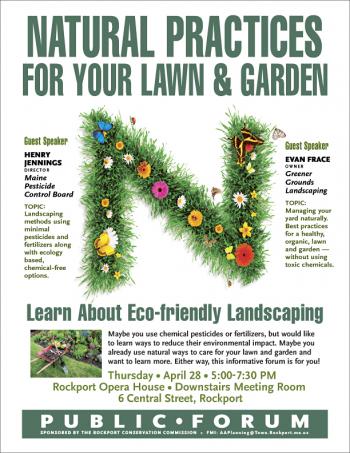Growing greener lawns, gardens at Rockport natural practices landscaping forum
ROCKPORT — How green can a yard get? What does “organic” or “pesticide/herbicide-free” really mean? Are organic blueberry and farm fields truly organic? And, do homeowners still use Round-Up? (Yes, they do).
But there are alternative landscaping and gardening methods far friendlier to the watersheds, drinking supplies, birds and bees.
And, there are laws governing neighbors’ rights to know what pesticides are being applied on nearby properties. If a neighbor has signed onto the state’s pesticide notification registry, it is mandatory to contact them prior to any pesticide application, whether residential or commercial.
Some towns, including Owls Head, Rockland and Montville, prohibit herbicides or pesticides to varying degrees and types of applications. See here for the Maine municipalities with pesticide ordinances.
On April 28, the Rockport Conservation Commission will host a Natural Practices for the Lawn and Garden forum at the Rockport Opera House, 5 to 7:30 p.m., in the downstairs meeting room.
Guest speakers will be Henry Jennings, director of the Maine Pesticide Control Board, and Evan Frace, owner of Greener Grounds Landscaping. They will talk about chemical-free alternatives to pesticides and fertilizers, and how to manage yards without using toxins.
“Maybe you use chemical pesticides or fertilizers but would like to learn ways to reduce their environmental impact,” the Conservation Commission said. “Maybe you already use natural ways to care for your lawn and garden and want to learn more. Either way, this informative forum is for you.”
Common types of pesticides
- Algicides control algae in swimming pools, lakes, canals and water used industrially or stored
- Biocides kill microorganisms
- Disinfectants and sanitizers kill or inactivate disease-producing microorganisms (like bacteria and viruses) on inanimate objects
- Fungicides kill fungi (many infect and cause diseases in plants, animals and people; examples: rusts, mildews, blights and molds)
- Fumigants produce gas or vapor to destroy insects, fungi, bacteria or rodents
- Herbicides kill weeds and other plants
- Insecticides kill insects
- Miticides kill mites that feed on plants and animals
- Microbials microorganisms that kill, inhibit or out compete pests, including insects or other microorganisms
- Molluscicides kill snails and slugs
- Nematicides kill nematodes (microscopic, wormlike organisms that feed on plant roots)
- Ovicides kill eggs of insects and mites
- Repellents repel pests, including birds and insects
- Rodenticides control mice and other rodent pests
- Rooting hormones and other plant regulators
For more information, email aaplanning@town.rockport.me.us.



























